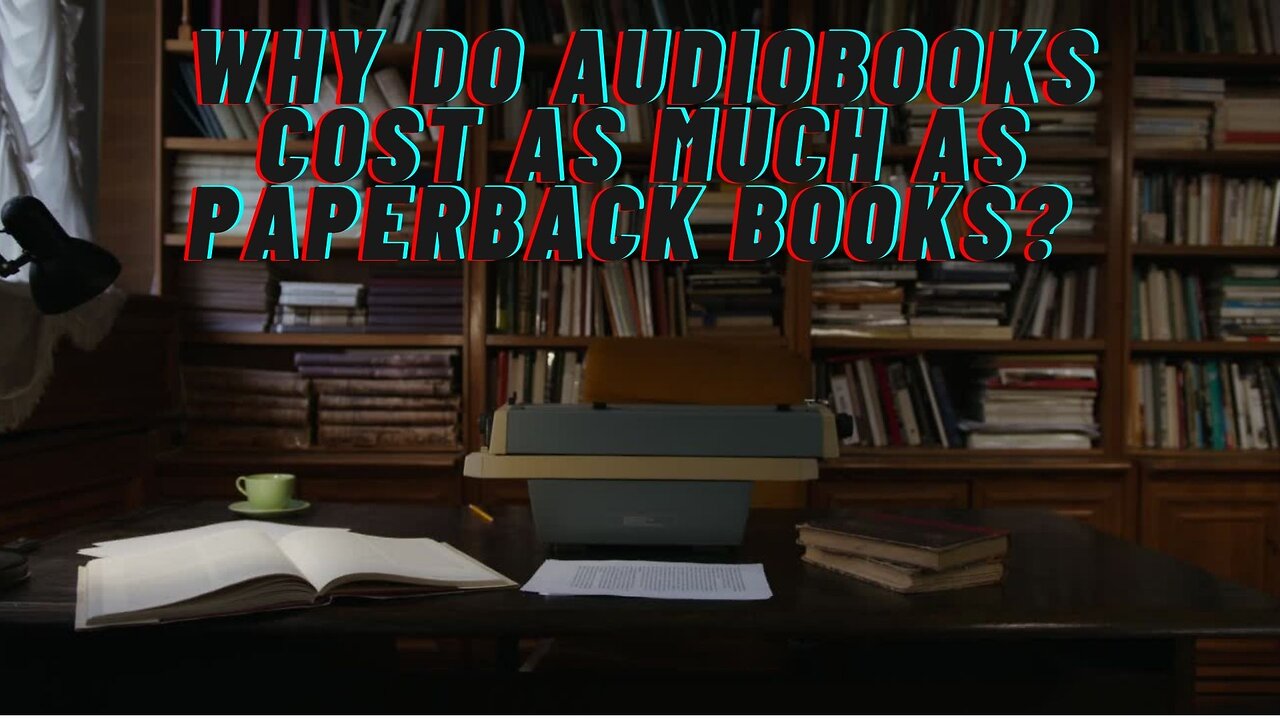Premium Only Content

Why do audiobooks cost as much as paperback books?
Why do audiobooks cost as much as paperback books?
Audiobooks are more costly than is immediately obvious to consumers. They are narrated by a processional voice actor, or the author, who had to sit down and read the entirety of the book. That individual would need to be compensated for their time. An audiobook takes considerably more time to produce than the actual audio time, often several times that length just to record the audio alone. The most efficient of voice actors or narrators will need to record at least two hours for each one hour of audio that makes it into final production.
There will likely be several takes of certain lines, paragraphs, and section to get the audio just right. In addition to a narrator, you may also require a recording artis, a mixing artist, an editor, and a director. The publisher is going to be paying all of these costs. In the case of Audible and Kindle books, some also has to synchronous the audio reading with the e-book text.
There are also pricing considerations. If the actual paperback book costs $15, you can’t price the electronic book for $10, because you will effectively be directing consumers towards the e-books instead and be losing paperback sales. The price points need to be essentially the same.
There was a time when audiobooks were on CDs. Back then, the price of audio books was very expensive.
These days you have an entire industry devoted to producing audiobooks with dedicated studios and professionals. Therefore, you don’t have multiple businesses like radio advertisements and musicians, competing for the same studio space. The audiobooks have their own dedicated recording spaces.
Audiobooks can be treated as a way to expand the catalog by companies like Audible. A large volume of audiobooks keeps customers subscribing.
The vast majority of books are unprofitable. A tiny minority are profitable enough to keep book companies afloat and subsidize the losses create by the majority of publications.
A publisher is effectively lumping all formats together when considering a book. If one format, say print, earns more than the other format, say audiobook, then the former is effectively subsidize the latter.
There is a common misconception that physical media, like paperback books, is much more expensive than digital productions like audiobooks from Audible. As with most goods, the vast majority of the cost is labor related. Just because a company is saving a couple dollars from not having to produce a physical copy of a book, does not mean that physical formats are less costly than digital formats.
Chat GPT:
Why do audiobooks cost as much as paperback books?
Audiobooks often come with a price tag that might seem high to consumers. This is due to several factors that are not immediately apparent. Firstly, the narration of an audiobook requires the services of a professional voice actor or even the author themselves, who spend significant time reading the entire book aloud. Naturally, these individuals need to be compensated for their time and expertise. Furthermore, the production of an audiobook takes considerably more time than the actual audio duration itself. In fact, it often requires several times the length of the final audio to complete the recording process.
Achieving the perfect audio for an audiobook involves multiple takes of lines, paragraphs, and sections to ensure high quality. Additionally, apart from the narrator, other professionals such as recording artists, mixing artists, editors, and directors may be involved in the production process. All of these costs are borne by the publisher. In the case of Audible and Kindle books, there is an added complexity of synchronizing the audio reading with the e-book text.
Price considerations also play a role. If the price of a paperback book is $15, setting the price of the electronic book at $10 would inadvertently encourage consumers to choose the e-book format over the paperback, potentially leading to a decline in paperback sales. Therefore, price points for both formats need to be essentially the same.
In the past, when audiobooks were distributed on CDs, their prices were notably high. However, today there is an entire industry dedicated to producing audiobooks, with dedicated studios and professionals. This means that audiobooks have their own dedicated recording spaces, separate from other businesses such as radio advertisements and musicians, reducing competition for studio availability.
Audiobooks also serve as a means for companies like Audible to expand their catalog and retain customers. Offering a large selection of audiobooks keeps subscribers engaged and satisfied.
It is important to note that the profitability of books, in general, is a challenging endeavor. The majority of books are not profitable, with only a small minority generating enough revenue to sustain publishing companies and offset the losses incurred by the majority of publications.
When considering a book, publishers effectively bundle all formats together. If one format, such as print books, earns more revenue than another format, like audiobooks, the former essentially subsidizes the latter. This ensures that all formats can coexist and contribute to the overall success of the book.
There is a common misconception that physical media, such as paperback books, is inherently more expensive than digital productions like audiobooks from Audible. However, the cost of labor plays a significant role in determining the price of goods. While producing a physical copy of a book may save a few dollars, it does not necessarily mean that physical formats are less costly than digital formats when considering all the related labor expenses.
Tags:
audible, is audible worth it, audible books free, audible membership, amazon audible review, how to use audible, amazon audible, audible amazon, audible worth it, how audible works, audible app review, audible review 2020, audible app, audible books, is audible free, audible credits, audible membership explained, audible review uk, audible audiobook, audible review 2022, audible review 2019, how does audible work, audiobook, audiobooks, paperback, audiobook vs reading, kindle vs. paperback, audiobook vs reading book, kindle vs. paperbook, audiobooks vs reading, audiobook vs paperback, audiobooks vs paperback, audiobook vs physical book, paperback books vs audiobooks, ebooks vs paperback vs audiobooks, paperback kindle, audio books, paperback vs kindle, which one is better audiobooks or paperback, are audiobooks cheating, listening to audiobooks
-
 3:29
3:29
The Last Capitalist in Chicago
1 year ago $0.06 earnedAmericans are spending like there is no tomorrow
2162 -
 1:15:29
1:15:29
Flyover Conservatives
1 day agoFrom Cool to Cringe: How Democrats Lost America’s Ear | FOC Show
38.5K13 -
 8:19
8:19
MattMorseTV
10 hours ago $4.94 earnedTrump is ACTUALLY DOING IT.
36.5K37 -
 11:30:43
11:30:43
ZWOGs
13 hours ago🔴LIVE IN 1440p! - Tarkov w/ Casey & crgoodw1n, Kingdom Come Deliverance, & More - Come Hang Out!
32.2K5 -
 2:30:56
2:30:56
We Like Shooting
17 hours ago $2.71 earnedWe Like Shooting 625 (Gun Podcast)
28K1 -
 1:45:02
1:45:02
Glenn Greenwald
8 hours agoIsrael Slaughters More Journalists, Hiding War Crimes; Trump's Unconstitutional Flag Burning Ban; Glenn Takes Your Questions | SYSTEM UPDATE #504
132K173 -
 1:29:31
1:29:31
Killerperk
5 hours ago $0.78 earnedRoad to BF6. Come hang out #regiment #bf6
30.2K2 -
 4:35:45
4:35:45
Jokeuhl Gaming and Chat
6 hours agoDARKTIDE - Warhammer 40k w/ Nubes Bloobs and AoA
20.9K2 -
 LIVE
LIVE
Cripiechuccles
7 hours ago😁💚💙MOTA MONDAY WITH CRIPIE💚💙 👌SMOKING, GAMING & WATCHING FLICKS!:😁
31 watching -
 36:11
36:11
Stephen Gardner
5 hours ago🔥'Burn ALL TRUMP FLAGS’ says Tim Walz + Democrat CAUGHT rigging own election!
25K19